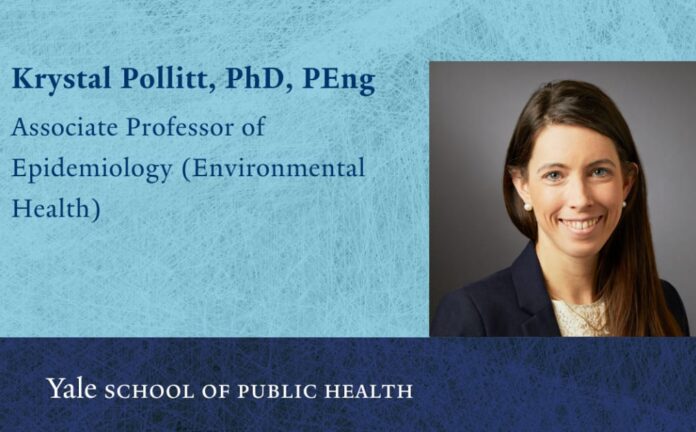Transforming Learning: How Dr. Krystal Pollitt is Pioneering Experiential Education at Yale School of Public Health
Explore the innovative teaching methods that bridge theory and practice, empowering students to engage deeply with real-world public health challenges.
Spotlight on Teaching: Associate Professor Krystal Pollitt and Experiential Learning at Yale School of Public Health
In the evolving landscape of education, experiential learning has emerged as a transformative approach that emphasizes learning through direct experience. At the Yale School of Public Health (YSPH), Associate Professor Krystal Pollitt, PhD, PEng, is at the forefront of this pedagogical shift, particularly in her Environmental Health Sciences course, EHS 530: Our Air, Our Health.
The Essence of Experiential Learning
Experiential learning is structured around four key stages: event, reflection, conceptualization, and experimentation. This framework not only enhances student engagement but also deepens their understanding of complex concepts by connecting theory to real-world applications.
Stage One: Event
The journey begins with a hands-on experience. In Dr. Pollitt’s course, students embark on a walking tour of New Haven, Connecticut, equipped with air sensors to measure airborne particulate matter. As they traverse the city—from bustling streets to serene neighborhoods—they witness real-time fluctuations in air quality. This immersive experience culminates at Yale’s Beinecke Library, a climate-controlled environment, where students can compare their findings against a stable backdrop.
Following the tour, students install air sensors in their homes, allowing them to collect data over time. This initial stage provides a concrete foundation for understanding the complexities of air pollution and its impacts on health.
Stage Two: Reflective Observation
As data begins to flow in from their home sensors, students engage in reflective observation. They analyze the characteristics of locations with varying pollution levels and consider how these factors intersect with their daily lives. Questions arise: What environmental features correlate with high or low readings? How do weather patterns influence air quality?
Dr. Pollitt emphasizes the importance of this reflective engagement, stating, "Information needs to be digested, processed, and then communicated back. This reflective engagement is essential in helping students develop critical thinking and a deeper understanding of the material."
Stage Three: Conceptualization
The third stage involves integrating personal experiences into broader scientific theories. Students contextualize their data within the larger framework of environmental health sciences. This personal connection to the data fosters a more critical approach to learning, as students are encouraged to question and analyze rather than passively accept information. Dr. Pollitt’s expertise in air pollution provides a rich backdrop for these discussions, allowing students to navigate the often complex and messy realities of scientific data.
Stage Four: Experimentation
The final stage of experiential learning is experimentation, where students test their hypotheses in a practical setting. In a unique twist, Dr. Pollitt’s class conducts a cooking experiment: students place air samplers in their kitchens while making pancakes together via Zoom. This activity allows them to observe how a common household task affects indoor air quality. By experimenting with different interventions—such as opening windows or turning on fans—students gain insights into managing their immediate environments.
A Broader Impact on YSPH
Dr. Pollitt’s innovative approach to teaching is not an isolated case; it reflects a broader commitment at YSPH to integrate experiential learning across various courses. Faculty members are increasingly incorporating real-world scenarios, case studies, and reflective exercises into their teaching methodologies. This dynamic approach enriches the educational experience, bridging the gap between theoretical knowledge and practical application.
During a recent meeting of the YSPH Office of Academic Affairs journal club, instructors discussed the diverse ways experiential learning manifests in their courses. While traditional teaching methods remain foundational, the infusion of experiential learning techniques enhances student engagement and comprehension.
Commitment to Future Generations
YSPH is dedicated to equipping students with the skills necessary to navigate the complexities of public health. By fostering critical thinking and metacognitive awareness, educators like Dr. Pollitt prepare graduates to address the rapidly changing realities of public health challenges.
To further support innovative teaching strategies, YSPH has launched the inaugural Grant for Innovation in Teaching program. This initiative aims to provide funding opportunities for faculty to develop and implement experiential learning projects in their courses.
For more information about this program, faculty members can reach out to Mike Honsberger, Director of Academic Affairs at YSPH.
In conclusion, the work of Associate Professor Krystal Pollitt exemplifies the power of experiential learning in shaping the next generation of public health leaders. By emphasizing hands-on experiences, reflective engagement, and practical experimentation, YSPH is committed to advancing education that is both scientifically rigorous and deeply connected to real-world applications.
For further insights into innovative teaching techniques at YSPH, visit the Spotlight on Teaching website.
